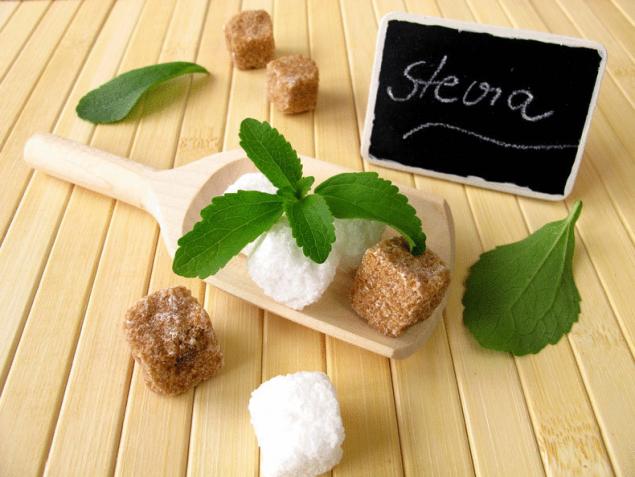A new sugar substitute — splash on the food market
 Bashny.Net
Bashny.Net

This is a small inconspicuous plant does not produce, at first glance, no impression – the terms of such thousands. However, it contains the incredible sweetness of nature. In General, the human senses react differently to different stimuli, but the taste buds of the tongue equally well most of us react to sweet. As a result, the consumption of sugar has steadily increased over the last 50 years it has increased in the world three times! And this leads to a steady growth in diseases associated with obesity, high blood pressure, diabetes. Only in Germany, 45% women, 60% men, 15% of children and adolescents are overweight or obese.
It is not surprising that the new sugar substitute made a splash on the food market. Stevia is native to Paraguay, where traditionally it is used for sweetening tea for a long time and was called the "sweet grass". Its feature is that coconut extract is very low in calories (this is important for diabetics!) and does not cause tooth decay. However, it has a slightly bitter taste, but it is so insignificant that not everyone will feel it.
In Asia and Latin America, stevia has already taken its place on the food market. More complicated is the case in Europe and the United States in 1984, and has been studies by American scientists, according to which stevia and its stevioside can be the cause of cancer. However, it later turned out that these studies were funded by rival concern that produces a different sugar substitute – aspartame (which, incidentally, is also suspected ability to cause cancer!). Currently, stevia is recognized as a safe product and is approved for use in the European food market.
Dr. Udo Kinle from the University Hohenheim explored the plant for 12 years by volunteers and confirmed that for 99% of people with diabetes, stevia is a wonderful sugar substitute (a person weighing 65 kg can use stevia to replace 80 grams of sugar – nearly 30 pieces!- without prejudice to their health).
Austrian studies scholars argue that the addition of stevioside in the toothpaste protects the teeth from caries and Tartar deposits – its action is similar to the action of xylitol obtained from birch wood.
Stevioside is 300 times sweeter than sucrose. In folk medicine, stevia is used to stabilize blood pressure, obesity and fatigue, strengthen the heart muscle. A daily dose of 750-1500 mg of stevioside. Not yet revealed any side effects.
Probably stevia – the plant of the future. Paraguay, the birthplace of this sweet gift of nature, cultivating about 2,000 ha, while in China today under this valuable plant has already allotted 60000 ha. whether still will be!
Source: www.sadovoda.ru
Tags
See also
How easy it is to manage your weight
Importantly! The destructive work of gluten in our body
Why suffer from gluten and fat — learn the truth!
Why store-bought tomatoes "cardboard" taste
Kiwi fruit for health and beauty
A stunning experiment— the family year not eating sugar
Healthy and unhealthy excess weight
New Apple diet: -7 kg without damage to health
How alcohol affects the body and physical form

















